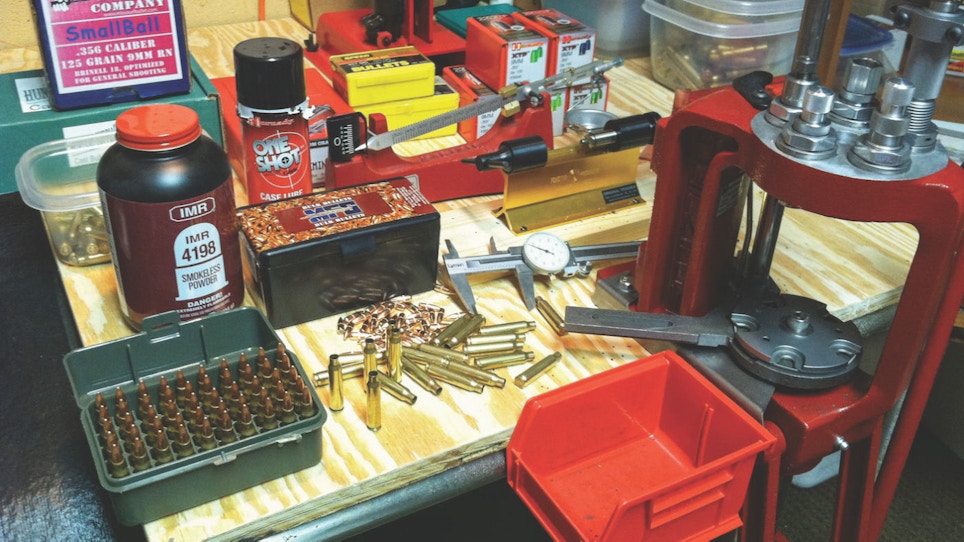
Plenty of options exist for anyone interested in getting into reloading, which can be quite enjoyable and rewarding for hunting, plinking, competition or self-defense. (Photo: Tom McHale)
Two terms typically are associated with loading ammunition at home: “reloading” and “handloading.” Both present opportunities for your store.
“Reloading” to some suggests merely refilling a case so that a cartridge can be shot again. “Handloading” suggests more attention to detail and more precision. For the purpose of this discussion, reloading is intended to include handloading.
Although there is money to be made in supplying either endeavor, there is a potential for added profit to be made by those who can capitalize on the totality of the concept. And as a side benefit, much of that money has nothing to do with presses, dies, powder, bullets or primers; it has to do with the added impulse sales that result from the reloaders who initially came for a specific item or two.
It takes a bit of explaining to connect all of the dots, but when connected, they make a very pretty picture. Bottom line: more traffic, more thoughtful buying and more impulse buying. It’s like a marketing double-tap.
There are two parallel tracks acting simultaneously and symbiotically. First are the dynamics of the reloading world and second are the dynamics of impulse buying once the reloading client is in the store.
“It’s a good, healthy way for repeatable visits,” says Robin Sharpless at Redding Reloading Equipment. “There’s always something new. There are new levels (of commitment).”
There are two basic motivations for making one’s own ammo: Saving money and creating more accurate loads or loads for obsolete cartridges. In all cases, those who make their own ammo shoot more.
Here is where stores have an interesting advantage over the Internet. Powder and primers, because of hazardous materials fees, etc. do not lend themselves to online ordering as much as some other items. That means visits to the real store in many instances.
Other components, dies, presses, etc. can be more competitive, but that doesn’t have to matter as much as some folks think. There is no substitute for having the hardware physically right there in front of buyers so that they literally can walk out with it after purchase.
There is a hierarchy in the reloading equipment world of products that range from very basic and lower priced to some of the best precision equipment in the world. Hence, customers can go through the different levels as they become more skilled and demand more from the ammo they produce. That means that over time, the same shooter likely will invest progressively in better and better gear. More sales result.
So, if that same shooter comes to the store repeatedly for powder and/or primers, which are perishable by nature, it means another chance to sell just about anything associated with shooting in addition to loading gadgets and gear. For example, when a reloader comes in to buy powder, it’s an opportunity to sell him or her other things ranging from targets and earmuffs to a new scope or even a rifle or handgun.
That’s where the impulse buying comes into the picture. Loaders tend to be gadgeteers and there is always something new, something that might make his or her job more fun, more productive and more precise. And since those same people shoot more, they’re usually interested in all sorts of other gear that has nothing to do with loading.
It’s even better if there is someone on hand in the store with a lot of loading experience to help answer questions and walk the shooter through the process to determine what equipment and supplies will work best for him or her.
Although sales staff expertise isn’t totally necessary, it can bring increased sales levels, as buyers are made aware of handy things they had not considered before their visit to the store.
The reloaders who are merely trying to save some money by reloading represent a predictable level of sales since they tend to use the lower-priced loading equipment and buy the commodity-level components. They are trying to save money — nothing wrong with that alone.
But those who load for obsolete cartridges or for higher performance ammo focus on feeding their firearms exactly the right fodder. This is particularly true when it comes to long-range shooting, and that activity gains in popularity by the day.
Everything about servicing the long-range shooting community translates into added sales. That discipline calls for the best of everything all the time — best rifles, best sights, best ammo. And since no two rifles shoot the same ammo exactly the same, serious long-range shooters invariably load their ammo to match their specific rifles.
The beauty of this scenario is that the industry itself is answering the hunger for better and better long-range shooting gear with a flood of truly exciting and effective new products. Those of you who are not already servicing this market segment likely are missing a whole lot of sales and customer engagement.
What we’re talking about here is not simply selling more products, but also genuine customer service. Serious shooters appreciate all the meaningful help they can get to allow them to get more out of their shooting — their passion.
Whenever passion is in the equation, all bets are off. Spending isn’t logical; it’s reactive and reaches higher limits. The situation just keeps getting better and better for retailers like you.
Bottom line: There is a whole lot more to servicing the reloading market than is apparent on the surface. And once that local market is established, its performance is repeatable.
Something to think about.





